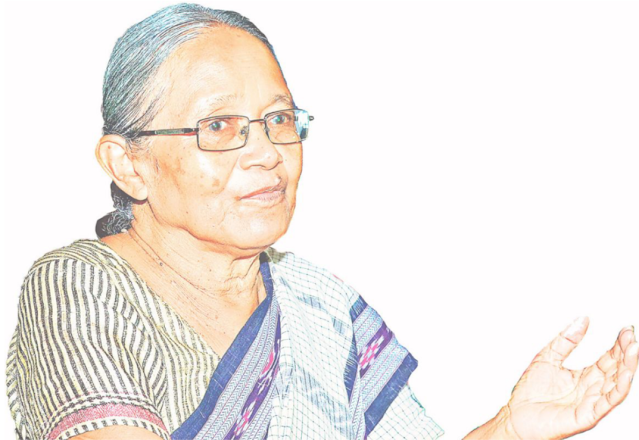Rose Kerketta ignited rebellion among Jharkhand's tribal women, embodied spirit of cultural preservation
By Harsh Thakor*
The passing of Rose Kerketta on April 17, at the age of 84, marks an immense loss to the literary and tribal communities of India. Known as a bold protagonist in shaping the Jharkhand movement and a prolific writer on Adivasi rights, Rose was not merely a figure of activism—she embodied the spirit of resistance and cultural preservation.
Kerketta's contributions to the Jharkhand movement played a pivotal role in crystallizing its goal—the formation of the state in 2000. She fiercely championed the causes of "Jal, Jungle, and Zameen" (water, forest, and land) and amplified the voices of tribal women, using her literary works as a platform for empowerment. Her writings and activism leave behind an indelible mark, inspiring generations to build on her legacy.
The passing of Rose Kerketta on April 17, at the age of 84, marks an immense loss to the literary and tribal communities of India. Known as a bold protagonist in shaping the Jharkhand movement and a prolific writer on Adivasi rights, Rose was not merely a figure of activism—she embodied the spirit of resistance and cultural preservation.
Kerketta's contributions to the Jharkhand movement played a pivotal role in crystallizing its goal—the formation of the state in 2000. She fiercely championed the causes of "Jal, Jungle, and Zameen" (water, forest, and land) and amplified the voices of tribal women, using her literary works as a platform for empowerment. Her writings and activism leave behind an indelible mark, inspiring generations to build on her legacy.
Born on December 5, 1940, in Kaisara village (now in Simdega district), Rose inherited the reformist zeal of her father, Eto Kharia, a teacher and cultural leader. Over her lifetime, she fused academic prowess with a relentless quest for women's rights and indigenous language preservation, becoming an epitome of tribal renaissance.
Kerketta’s professional journey began in 1967 as a librarian at Simdega College. Her career evolved as she became a Hindi professor at Sisai College and later joined Ranchi University as a professor of Kharia language, where she worked closely with Ram Dayal Munda—a fellow intellectual and protagonist of the Jharkhand movement. Together, they laid the foundations of tribal and regional language studies, preserving oral literature and cultural traditions.
As a writer, Rose’s significant works—"Kharia Lok Kathaon Ka Sahitik Aur Sanskritik Adhyayan," "Premchandao Ludkoe," and "Sinkoe Sulolo"—garnered her accolades, including the Madhya Pradesh government’s ‘Rani Durgawati’ award. Her contributions resonated deeply within the literary world, shining a light on tribal issues often overlooked.
Beyond academia, Kerketta was an activist in the truest sense. She led initiatives under Mahila Samakhya to educate and empower rural women and relentlessly fought against patriarchal tendencies, even within her own community. Her fearlessness extended to organizing protests in challenging regions, often stepping into spaces where even authorities hesitated.
Rose’s legacy as an editor of "Adhi Duniya," a magazine that ignited rebellion among tribal women, and as a resilient advocate for land rights, remains unparalleled. Her leadership in addressing gender-based violence, like the protest she led in Mandar village in the 2000s, underscores her undeterred commitment to justice.
Her death leaves behind a void, but her thoughts, writings, and relentless spirit will continue to inspire new generations. As we remember Rose Kerketta, let us honor her contributions by nurturing the seeds she planted—of equality, cultural preservation, and rebellion against injustice. She will forever remain a lotus in the garden of tribal empowerment.
---
*Freelance journalist
Kerketta’s professional journey began in 1967 as a librarian at Simdega College. Her career evolved as she became a Hindi professor at Sisai College and later joined Ranchi University as a professor of Kharia language, where she worked closely with Ram Dayal Munda—a fellow intellectual and protagonist of the Jharkhand movement. Together, they laid the foundations of tribal and regional language studies, preserving oral literature and cultural traditions.
As a writer, Rose’s significant works—"Kharia Lok Kathaon Ka Sahitik Aur Sanskritik Adhyayan," "Premchandao Ludkoe," and "Sinkoe Sulolo"—garnered her accolades, including the Madhya Pradesh government’s ‘Rani Durgawati’ award. Her contributions resonated deeply within the literary world, shining a light on tribal issues often overlooked.
Beyond academia, Kerketta was an activist in the truest sense. She led initiatives under Mahila Samakhya to educate and empower rural women and relentlessly fought against patriarchal tendencies, even within her own community. Her fearlessness extended to organizing protests in challenging regions, often stepping into spaces where even authorities hesitated.
Rose’s legacy as an editor of "Adhi Duniya," a magazine that ignited rebellion among tribal women, and as a resilient advocate for land rights, remains unparalleled. Her leadership in addressing gender-based violence, like the protest she led in Mandar village in the 2000s, underscores her undeterred commitment to justice.
Her death leaves behind a void, but her thoughts, writings, and relentless spirit will continue to inspire new generations. As we remember Rose Kerketta, let us honor her contributions by nurturing the seeds she planted—of equality, cultural preservation, and rebellion against injustice. She will forever remain a lotus in the garden of tribal empowerment.
---
*Freelance journalist


Comments